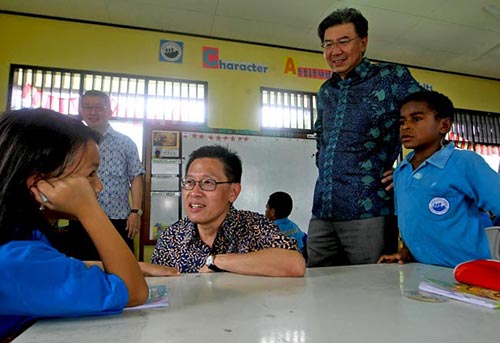
Lippo Group chief executive James T. Riady, kneeling, visits a school in Doyo Baru village in Jayapura. The Lippo Group/JSAT partnership plans to build a telecommunications network in Papua in hopes of giving residents better connectivity. (SP Photo/Joanito De Saojoao)
Jayapura. The Lippo Group has established a partnership with JSAT, Japan’s largest telecommunication satellite company, to build telecommunication networks in Papua in hopes of giving residents in the province’s remote areas better access to Internet and educational television programs.
Lippo Group chief executive James T. Riady said that education was the core solution to the various issues faced by the people of Papua and that the telecommunication network built by the partnership would provide basic infrastructure needed to boost access to education in the region.
“Indonesia has been independent for more than 65 years, yet there remains plenty of places that have yet to be touched by our national development efforts. As we can see, regions in Papua, especially remote areas such as Mamit and others, need infrastructure and attention in education,” James said during a visit to the Sekolah Lentera Harapan (SLH) in Sentani, Papua, last Tuesday.
JSAT has 16 satellites in Asia and has been in partnership with the Lippo Group previously. Lippo Star is the product of this partnership.
“They are willing to help in Papua, especially in the installation of VSAT [very small aperture terminals] in schools in remote areas, so that they would become connected. They provide Internet as well as the best educational programs in the world for students here to watch,” James said.
Three schools in Papua have been selected to be part of the pilot project in the partnership, namely SLH in Kampung, Harapan Kecamatan Sentani, Sekolah Papua Harapan (SPH) in the Doyo Baru village of Jayapura, as well as the SLH in Mamit Village in the Tolikara district.
In the future, the program will be aimed at other schools in remote areas, mainly those located in mountainous regions.
“The VSAT will be installed in one or two months, not just in Sentani but also in Mamit. The models will be found in two school in Sentani and one in Mamit, if the concept goes well,” James said.
Shinji Takada, chief executive of JSAT, said that they had put initial efforts to improve the quality of education and the school’s facility prior to constructing the connectivity network.
“We have sent teachers with a new concept, where education is not only offered through knowledge but also the learning process. Our teachers here are graduates of UPH [Universitas Pelita Harapan], and they have come from different parts of Indonesia to teach, with the support of local government,” Takada said.
Paul Wetipo, principal of SPH said the installation of a telecommunication network would be useful to teachers.
“This [VSAT] will open up access to the outside world, especially because education is something that continuously evolves. Accessing the internet will offer teachers more knowledge and they will also be able to guide students more effectively,” he said.
Full disclosure: The Lippo Group owns BeritaSatu Media Holdings, which owns the Jakarta Globe and several other media properties.
